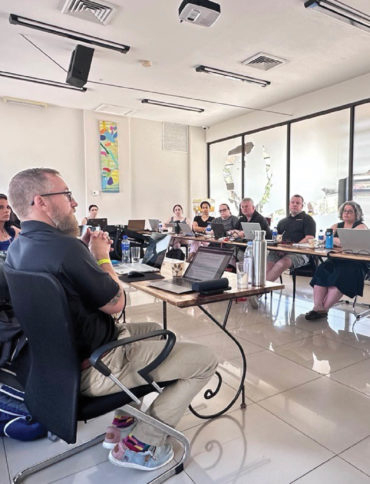In February 2024, FDAQRC travelled to Costa Rica for our annual Face-2-Face meeting. These in-person meetings are highly anticipated by the whole team. President Christopher Rush explained, “It’s a great opportunity to talk about our accomplishments from the past year, and more importantly our goals for the future and make sure we are growing as a team.”
FDAQRC's Memories in the Making
We maintained a balanced schedule of meetings, team bonding, and fun enjoying all Costa Rica has to offer. We had team dinners, celebrated a birthday and an anniversary! Vice President Michelle Copeland explained, “My favorite part has been the dinners, both as a big group and as smaller groups. It’s a great opportunity to catch up and get to know everyone on a more personal level.”
While in Costa Rica, our team enjoyed the sights and learned a lot about the native wildlife. At the resort, we were able to observe howler monkeys, Magpie Jays (similar to Blue Jays), baby hermit crabs, stick bugs, and a family of friendly felines.
Additionally, a group of employees visited the Diamante Nature Preserve, where they continued to learn about native species of plants and animals, as well as learn to make their own chocolate.
Another group ventured out on a sailboat where they were able to enjoy snorkeling out in the beautiful waters of Costa Rica. They observed various kinds of tropical fish and coral.
In addition, a small group chose to go ziplining. Flying through the sky, reaching almost 50 miles per hour, the team enjoyed seeing an aerial view of Costa Rica’s beautiful coastline.
Fer-de-lance Snake
Fer-de-lance Snake
Vipers
Vipers Antivenom
The antivenom for some Costa Rican vipers is produced by injecting a specific horse with snake venom; the horse then generates antibodies for the antivenom.
Poisonous Frogs
Poisonous Frog
Certain Costa Rican poison frogs rely on a specific ant for poison production; without it, they stop producing poison. Captive frogs usually lose this ability due to their diet.
Sloths
Sloth
Sloths descend weekly from treetops to the lower canopy for bathroom purposes; this behavior is consistent among sloths, not just in Costa Rica.
Monkeys
Monkeys
Costa Rica hosts various monkey species. The 4 local to Costa Rica include Squirrel Monkeys, White-Faced Capuchins, Mantled Howlers, and Spider Monkeys.

A Closer Look at Inspection Readiness: Mock/Hats On-Off Approach

How to Secure Project Assignments with FDAQRC: A Guide for Consultants

Tips For Preparing & Hosting a Successful Audit

Regulating AI in Clinical Trials: What ICH E6(R3) Does (and Doesn’t) Say

Explores the Differences Between Auditors and Inspectors in the Clinical Research Industry

Competency Based Programs Contribute to Early Clinical Research Professional’s Training

15 Years of Excellence: FDAQRC's Journey and Future Vision


